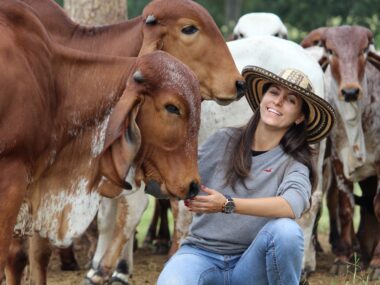Written by Jacquie Moore, BA’97
Well-prepared and keen to connect with her students, Elizabeth Tingle felt a growing twinge of nervousness as a cohort of high schoolers filed into her classroom.
Teenagers of all shapes and sizes found their desks and settled in for her lesson on positive body image. Tingle, MA’20, had been teaching language arts, social studies and health for many years in Calgary and Edmonton, but she was acutely aware that the topic she was about to present was a potential minefield of confusion, discomfort and shame.
“I remember wondering about how my students would interpret that lesson,” says Tingle. “We have tumultuous relationships to our bodies during the period of adolescence amid puberty.” She worried about how students in larger bodies might react, and if students already struggling with compulsive exercise habits or disordered eating might become defensive. “I wanted to relieve some of that pressure and spare them some of that pain, but I didn’t know how.”
Tingle’s concerns eventually moved her to leave her position as a secondary school teacher to devote herself to finding a better way to talk to kids about cultivating healthy relationships to their bodies. She’s now a teaching instructor in the Werklund School of Education and lab co-ordinator for the faculty’s Body Image Research Lab.
Part of Werklund’s Educational Psychology Programs, the Body Image Research Lab is headed up by Dr. Shelly Russell-Mayhew, BSc’94, MSc’98, PhD’03. She’s a professor and a registered psychologist who oversees a team of grad students and postdoctoral scholars who conduct research on body image, eating disorders, obesity and weight bias, and how the spectrum of eating and weight-related issues materialize in education and other settings.
Russell-Mayhew, like Tingle, is striving to upend the way our society thinks, talks, writes policy, and otherwise engages with diet culture and body size. In short, she wants to see classrooms become “weight-neutral” zones, free of weight-centric health instruction around food, exercise and obesity. It’s a boldly counter-intuitive perspective — shouldn’t teachers help teach kids how to eat well and stay fit? — but her research shows that taking weight-related health promotion out of classroom conversations could dramatically improve the physical and mental health of kids and teens.

Russell-Mayhew, who has spent 20 years exploring the prevention of eating disorders in school contexts, recognizes that it’s understandable that problematic messages around food and weight show up at school. “All of us, including teachers, live in a society that uses weight as a measure of attractiveness and morality — we’re swimming in the water of diet culture that values thinness as a sign of good health,” she says.
Having to adhere to one style of gym attire or trying to get comfortable in a one-size-fits-all desk can make school an emotionally devastating experience for kids of varying sizes. Run-of-the-mill directives by a teacher or lunch supervisor along the lines of, “Eat your veggies!” or praise like, “That looks like a healthy sandwich!” can be confusing or received as judgment, especially by elementary-school kids who generally have little control over the contents of their lunch boxes.
Tingle recalls her own daughter’s daily panic when her kindergarten teacher started a daily “snack check.” On days when every student in the class had what the teacher deemed a healthy snack, the kids would get to do a collective “Dance of Joy.” If one child’s snack wasn’t nutritious? No Dance of Joy. “My daughter became anxious about what was in her lunch kit — she wouldn’t take a banana muffin to school because it looked like a cupcake.” Tingle says, while her daughter’s teacher was excellent, “she just didn’t understand how that message would be received by a four year-old.” What food is sent to school, she says, “is the territory of the parent, not a supervising teacher.”
Health education can encourage healthy behaviours without promoting unhealthy dieting behaviours or a preoccupation with one’s shape or size.
Many might ask: what could be wrong with teaching kids healthy eating habits in the classroom? The problem, Russell-Mayhew explains, is that research shows that these educational efforts, no matter how well-intentioned, can have reverse effects on the psychology and behaviours of kids and teens, awakening or elevating feelings of shame, confusion and self-loathing.
“We never know how someone is feeling about their body,” she says. “The girl with a large body might feel confident and the kid living in the ‘normal’ body — whatever that means — is secretly struggling to look better.” Health education can encourage healthy behaviours without promoting unhealthy dieting behaviours or a preoccupation with one’s shape or size. Talking about weight, measuring weight and other discussions can also increase the likelihood of weight-based bullying for children of all sizes, leading to low self-esteem, social exclusion and negative health outcomes.
Russell-Mayhew and her team recently produced a summary of research and recommendations titled Weight-Neutral Well-Being in the School Setting that details the harms of the promotion (intentional or not) of “a preference for thin bodies, moralization of weight and a belief that thinness represents good health.” As well, the report calls out how the emphasis on maintaining a “healthy weight” increases eating disorder risk, even when the dangers of eating disorders are discussed in the classroom. Their research — published in collaboration with scholars Dr. Sarah Nutter, MSc’04, PhD’19, from the University of Victoria and Dr. Jessica Saunders, PhD, from Ramapo College of New Jersey (both former members of the Body Image Research Lab) — has found that learning assignments “that invite students to measure their weight/BMI or encourage the tracking of food, calories, steps or other forms of exercise can prime vulnerable students for a disordered and unhealthy relationship with their bodies.”
The team’s recommendations include the “avoidance of health messages that a so-called ‘healthy weight’ is completely under an individual’s control.” That line of thinking unintentionally perpetuates weight bias in the school setting and, the summary says, “students with larger bodies may experience greater stigma.”
“Students of all sizes report bullying based on weight more frequently than bullying based on academic ability, physical ability, race, religion or class.”
Sadly, and predictably, stigma breeds bullying. The Lab reports that “students of all sizes report bullying based on weight more frequently than bullying based on academic ability, physical ability, race, religion or class.”
“Children are reminded every day in all sorts of cruel ways that their bodies don’t fit in,” Russell-Mayhew says. “Weight-based bullying in the school setting teaches weight bias to both victims and bystanders and is associated with several negative physical and psychological consequences, including body dissatisfaction and disordered eating behaviours.”
Exacerbating the issue is the exclusion in school and government policies of body weight as a protected identity in most provinces and states. “The school is a microcosm of the larger society,” says Russell-Mayhew. “If we could get some traction starting with changing school policies to include weight and body size — just as they include race and gender — as identifying factors in bullying, that would improve practices when someone is teased about their body.”
While influencing change to policy is a major goal of the Lab’s research, Russell-Mayhew and her team also want to support and empower future teachers with evidence-based learning and language that promotes joy, health, and acceptance of one’s body shape and weight.
“The factors behind weight and health are complex, and we need to be really careful about how diet culture affects what we’re bringing into schools,” says Tingle. “It’s not easy to thread the needle of that conversation.”
In a recent episode of The PodClass, an Ever Active Schools and Werklund-based podcast focused on school-health, Tingle hosted American dieticians Anna Lutz and Katherine Zavodni, both with expertise in treating eating disorders. The three of them agreed that teachers should be supported to do less around weight-related health promotion. “It’s not a teacher’s job to change the food that a child may have in their lunchbox,” said Zavodni. “That takes a lot of pressure off teachers who only need to make sure interactions around food are positive.”
With that in mind, Lutz said one of the best things a teacher can do is, “to sit down and enjoy a meal with children — break bread and enjoy social time, without shining a harsh spotlight on what food you, or they, are eating.”
Zavodni added that teachers can model taking breaks to eat a snack or prepare a taste test for kids without labelling anything good or bad or plan a lesson around foods from a variety of cultures.
“Healthy eating is not one thing,” said Lutz. “That’s where we get into trouble in school settings. Food is much bigger than what’s on the plate.”
The sweet spot of health-related eating and exercise habits for children, teens and adults alike is found, says Russell-Mayhew, at the intersection of awareness and pleasure.
“Kids need to learn to be intuitive about and responsible for their wellness, and to ask themselves questions about that,” she says, adding we can all learn to push back on external forces that are based in fear and fat phobia. “The real goal is not about numbers and calories and size,” she says. “It’s to teach kids to have a life-long healthy relationship with food and movement that gives them joy in their bodies.”




